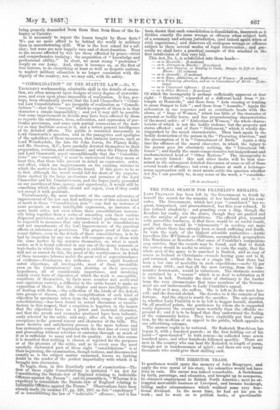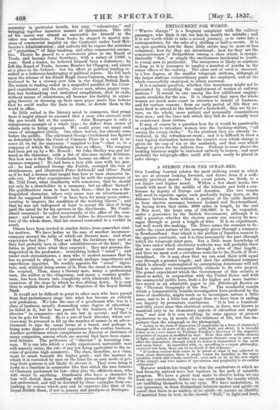THE DIRECTOR TRADE.
IF gentlemen would spare the memory of John Macgregor, and apply the true moral of his story, his calamities would not have been in vain. His career was indeed remarkable. A Scotehman by birth, parentage, and education, and brought up to commerce, he obtained employment in British North America ; next he attempted mercantile business at Liverpool, and became bankrupt, failing under circumstances which realized some very fractional. dividend. In the mean time, he had set his pen to work ; and he went on to publish books, of questionable
accuracy in particular details, but very "voluminous," and bringing together immense masses of information. This side of his career was almost as successful for himself as the other was calamitous. From books he stepped to special mis sions of commercial inquiry on the Continent under Lord Melbourne's Administration ; and actively did he expose the mistakes
of "protection" of false banking, and other commercial anoma
lies. Thence he passed to a permanent place in the Board of Trade, and became Joint Secretary, with a salary of 1500/. a year. Bred a trader, he believed himself born a statesman ; he left the Board of Trade, became Member for Glasgow, and aimed at a place in the Cabinet : but his effort at political trading resuited in a ludicrous bankruptcy of political repute. He fell back upon the scheme of his friend Hugh Lines Cameron, whom he introduced to be a viceroy over him in the Royal British Bank. His return to trading ended in a magnified parallel of his Liverpool experiment ; and the active, clever man, whose proper vocation was bookmaking and statistical compilation, died in exile, without means of subsistence, all because his facility in arranging theories or dressing up facts upon paper made him believe that he could realize the facts in trade, or dictate them to the world in office.
So little suited is the literary mind to commerce, that primi facie it might almost be assumed that a man who succeeds with the pen would fail at the counter. John Macgregor is only a conspicuous example of a whole type; he differs from scores of others only in being exposed. We could point out many such
eases of misapplied ability. One other, indeed, has already come before the public. The celebrated George Cruikshank has figured as defendant before the Court of Common Pleas in a suit to recover 51. 9s. Cid, for stationery " supplied to him "—that is, to a company of which Mr. Cruikshank was an officer. The company had been got up by a Mr. Howell ; Sir John Shelley was put forward as the chairman with a list of directors mostly fictitious. But how was it that ill.. Cruikshank became an officer in an insurance-company? He had been a very able man with his pencil: he had satirized George the Fourth, scourged the vice of drunkenness, and illustrated Peter Schlernihl and Oliver Twist as if he had a daimon that taught him how to turn character inside out. But what acquaintance had he with the experiences of Mr. Tidd Pratt, what familiarity with commerce, that he should not only be a shareholder in a company, but an officer thereof ? His qualifications seem to have been these,—that he was a distinguished character, whose very name was an advertisement ; that he supposed himself "to have been for many years endeavouring to improve the condition of the working classes" ; and that he was not indisposed at least to accept the idea of being paid the usual fee for his services in the directorate. Mr. Cruikshank consented : he called occasionally at the office of the company; and became so far involved before he discovered the nature of the whole sham, that his counsel consented to a verdict in court.
Others have been invited to similar duties from somewhat similar motives. We have before us the case of another insurancecompany around the table of which sat literary men ; and what experience had they ? They saw that the furniture was such as they had probably seen in other establishments of the kind ; the forms in print were what they expected ; they met persons distinguished in the profession ; everything looked " usual" ; and under such circumstances, a man who is modest assumes that he has no ground to object, or to intrude perhaps impertinent and superfluous inquiries. He readily appends the " usual " signature, and, without being aware of it, from the usual is drawn into the unusual. Thus, many a literary man, many a professional man, the soldier or the clergyman, and many a country gentleman, has been drawn into complicity with wholesale fraud, unconscious of the steps by which hewas sliding down. It is easy thus to explain the position of Mr. Stapleton of the Royal British Bank.
It would not be difficult to point to other men who have passed from that probationary stage into what has become an entirely now profession. We take the case of a gentleman who was in a class of business usually demanding some degree of education; he failed in it, but he has passed to the business of being "a director" in companies—not in one but in several ; and that is how he gets his bread. He is a sort of hack director, whose services may be procured to fill up the number of names in an advertisement, to sign the usual forms at a board, and perhaps to bring some degree of practical experience to the routine business. Another gentleman stands conspicuous as director or chairman of many companies, among which are several that have been organized failures. The profession of " director " is becoming common. It is one into which a really experienced mercantile man will scarcely enter, the rata of pay not being equivalent to the income of genuine high commerce. The class, therefore, as a class, must be much beneath the higher grade ; and the manner in which it is recruited by men on the hunt for an easy mode of getting their guineas is not likely to elevate it. They even bring it dawn to a function in commerce like that which the sine damnee of Chancery performed for law—they play the affidavit-man, who will swear to anything. Gentlemen who have a character to lose will shrink from meddling with proceedings that they do not understand, and will be deterred by these examples from embarking in courses which may end in exposure like that of the Royal British Bank, if not in penury and paralysis at Boulogne.



































 Previous page
Previous page